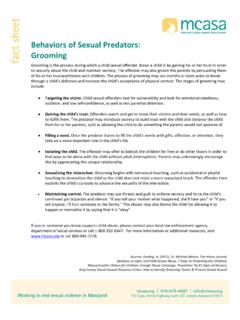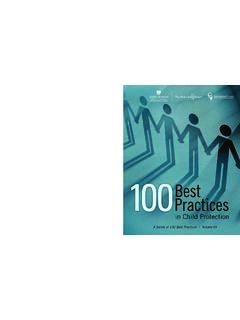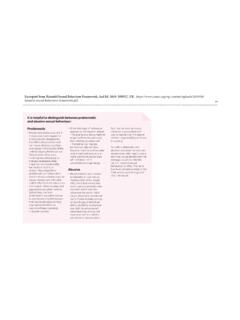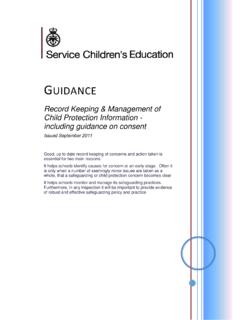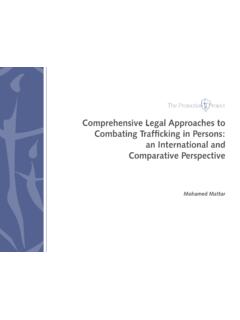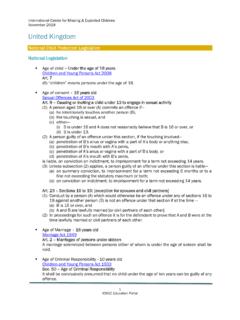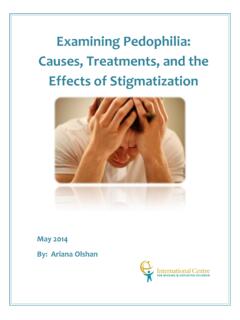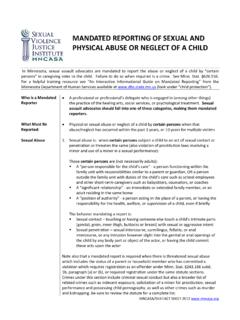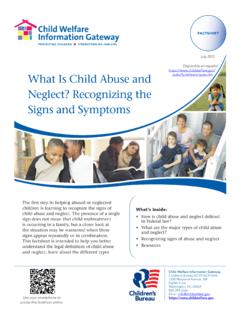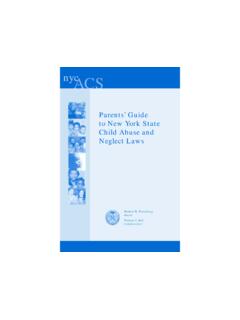Transcription of The Investigative Interview In Child Sexual Abuse
1 The Investigative Interview In Child Sexual Abuse O c t o b e r 2 , 2 0 1 5 A C C R A , G H A N A Jordan Greenbaum, MD Our Vision & Mission Making the world safer for children by eradicating Child abduction, Sexual Abuse and exploitation. We advocate, train and collaborate to protect the world s children. Objectives List reasons why a Child may delay disclosing Abuse , or recant the allegation Recall the differences between a first responder Interview and a forensic Interview Recall 3 helpful techniques to use when talking to children who are disclosing Abuse Recall common errors in talking to suspected victims of Sexual Abuse 8 year old boy tells his teacher that his 20 year old uncle made him suck on his (uncle s) penis and the uncle told him a hidden camera had videotaped the whole thing. W h a t d o w e k n o w a b o u t c a s e s l i ke t h i s ? 4 A Child s disclosure of Sexual Abuse is arguably the most important aspect of the case.
2 Myth or Reality? When a Child discloses Abuse , they almost always give a purposeful and complete disclosure. Myth or Reality? The Disclosure Accidental vs. Intentional Often incomplete Why? Child anxious about response Responder doesn t ask the question Fragmented memories Stress inhibits memory Too many experiences to describe Children often make up stories about being abused. For attention, Myth or Reality? How do false allegations occur? Child intentionally fabricates Abuse Adult intentionally manipulates the Child Adult misinterprets Child s words/actions Adult inadvertently suggests Abuse Poor interviewing technique False Allegations of Abuse Canadian study found 4% false allegations for all types Abuse Children and custodial parents least likely to fabricate Custody issues associated with increased rate: 12% Interview technique is critical Best done by trained interviewer Young children can be suggestible Trocme and Bala, 2005 If a Child was abused, they would tell someone immediately.
3 Myth or Reality? Disclosure Rates Studies of adults: 55-69% did not disclose during childhood 5-13% reported to authorities 10-46% only disclosed at time of survey London, 2007 Time to Disclosure 051015202530354045 CombinedBoysGirls 1481 F, 1145 M National probability sample Phone Interview CSA before 18 years Median age at time of Abuse : years Finkelhor, 1990 Why would a Child delay telling someone? Fear Benefits Guilt Unaware of victim status Hopelessness Keep offender out of trouble Shame Loyalty to offender 5 yo girl: He said that if I told anyone, he d go to jail and I d never see him again. (father) 10 yo boy: If I told, I d get in trouble. I wasn t supposed to go over to his house. (neighbor) 6 yo boy: He said if I told anyone, he d kill me. (15 yo step-brother) 14 yo girl: How could I tell? He had a video of me getting raped he d put that on the internet. Predictors of Disclosure Rates London, 2007 Age Gender Cultural/ Ethnic differences Relationship to Offender Level of maternal support Predictors of Disclosure Rates If a Child said it didn t happen, it didn t happen.
4 E v e n i f h e m a d e a d i s c l o s u r e l a s t w e e k . Myth or Reality? Denial and Recantation Estimated rates vary with research study Difficult to measure Denial of Abuse 6%-72% (Bradley; Sorenson) Recantation 4-23% (Bradley; Malloy) Factors associated with recantation: Younger age of victim Abused by parent figure Had no support by nonoffending caregiver It does occur. Frequency is controversial. Malloy, 2007; Bradley, 1996, Sorenson, 1991 8 yo girl disclosed ongoing severe Abuse by her father. In her forensic Interview she provided details about things she couldn t have known without having had the experience. Police arrested the father. One week later the mother brought the Child back to the police: She s got something to tell you. Child recanted her statement and said she d lied because she was angry at the father. Police discovered the mother had taken the Child to visit the father in jail the day prior.
5 Why do you think the mother acted this way? Why did the Child recant? Police located a collection of pornographic pictures and eventually identified the 10 yo male victim. Eventually they identified the offender, who was arrested. The offender confessed to the allegations and verified that the 10 yo boy was the Child in the pictures. Child repeatedly denied any Sexual victimization when interviewed. Why do you think the Child denied the allegations? Children as young as 3 or 4 years can tell us about their Abuse . Myth or Reality? Memory We reconstruct our memories Parts of memories may be inaccurate Misinformation can lead to inaccurate, false memories Memories start very young Lieb, 1997 Childhood Memories Young children: Remember less Lack ability to construct coherent narratives May recall different things on different occasions Lack detail Memories for stressful events may be stronger Lieb, 1997 Suggestibility Young children most vulnerable What factors increase the risk?
6 Peripheral, irrelevant details of event Leading or suggestive questions Use of props and cues in very young children Bystander status Original memory is weak Interviewer authoritarian, intimidating Repeated questions Asking Child to imagine an event Lieb, 1997 Language & Development: 3-5 years May be able to provide information on: Who What (where on body touched, etc) Where it occurred If event happened one time or >1 time Usually cannot: Tell how many times event occurred Provide reliable sequence of events Tell when something happened Kellogg, in Jenny, 2011 Language & Development: 6-11 years May be able to provide information on: More details about Abuse event Idiosyncratic details (smell, taste) Relative frequency of events (daily, weekly, etc) Age Abuse started/stopped Physical and behavioral symptoms Can correct mistakes introduced by misleading questions May not be able to: Provide exact dates of events or correct sequence Precise timeframes for symptoms Understand abstract concepts Kellogg, in Jenny, 2011 Language & Development: 12-17 years May be able to provide information on: More idiosyncratic details (smell, taste) Better info on times, duration of events May not be able to: Understand abstract concepts consistently Understand adverse consequences of Abuse (ex.)
7 STI) May sensationalize May feel embarrassed, reluctant to talk Kellogg, in Jenny, 2011 The Forensic Interview Not the same as the first responder Interview . First Responder Interview Usually Child makes disclosure Your goals: Provide reassurance and support Obtain enough information to decide if Abuse /exploitation may have occurred. Don t need to be certain of Abuse . Don t need to know specific details. Ask as few questions as possible. Make necessary report First Responder Needs to Is there a reasonable suspicion that Abuse /exploitation occurred? Is the Child safe right now? Will the Child be safe is he/she goes home today? Does the Child need immediate medical/mental health evaluation? Forensic Interview Designed to obtain information relevant for investigation Determine if Abuse occurred Who, what, where of events Is a structured Interview Developmentally-appropriate Legally defensible Part of a multidisciplinary process Ideal conditions Trained interviewer Child -friendly environment Minimal number of interviews Privacy Multidisciplinary participation Typical Structure of Interview phase Ground rules, expectations phase phase (questions about possible Abuse ) of Interview Goals Minimize suggestibility Maximize free recall Obtain comprehensive, accurate statement Types of Questions Open-ended Leading Yes/No Multiple Choice Specific/ Direct Suggestive Invites free narrative Most reliable form of questioning Samples: Open-Ended Questions Can you tell me about that?
8 What happened next? Tell me some more Provide more direction than asking for free narrative Easier for younger children Specific/Direct Questions You said you heard something. Do you remember what it was? What did it feel like? You mentioned you were sleeping. Where were you? Open-ended questions Specific/Direct Invites single word answer, not narrative May try to please by saying, Yes May be biased to one answer (always says, No ) Child may guess when doesn t know The Yes/No Questions Nahi! Nee! Ne! La! Shi! Hai! Ken! Si! May lead to misinformation Child s desire to please Try to avoid these, even when talking to adults Leading and Suggestive Questions When did Mr. ___ touch you? I ll bet that hurt, didn t it? What did he say he d do to you if you told? What type of question is this? Were you in the bedroom, the living room or somewhere else? Tell me all about .. Child complains of genital pain.
9 Mother says, Who touched you? How many times did it happen? Did it hurt? So, then what happened? Didn t you tell him to stop? What did he say after he was done? Age-appropriate language Simple questions (1 idea per question) Short sentences with easy words Don t correct or interrupt Clarify terms No jargon or legal terms Story may be incomplete Interview Techniques Trauma-Informed Approach Sexual Abuse /exploitation causes traumatic stress Trauma can lead to variety of behaviors, reactions Talking can trigger memories, stress Need to take steps to Ensure Child feels safe Minimize re-trauma NCTSN Common Interview Errors Failure to build adequate rapport with Child Failing to assess developmental abilities Assuming Child interprets Sexual experiences in same way as adult Focusing only on behavior of alleged offender Repeating questions when don t get expected answer Reinforcing Child for giving expected answers Mart, 2010 What Happens After the Interview ?
10 Child needs support from others Offer medical exam Assess for traumatic stress, may need therapy Need to ensure Child is safe Ensure any other at-risk children are safe Need to gather evidence Corroborate details of Interview Interview alleged offender Interview other potential victims, witnesses Build case for prosecution if feasible Conclusions In cases of suspected Sexual Abuse : Child s statement is critical Even young children can provide information Care needs to be taken when asking questions Need victim-centered approach Jordan Greenbaum, MD International Centre for Missing and Exploited Children Stephanie Blank Center for Safe and Healthy Children Children's Healthcare of Atlanta Tel: +1 404-785-3829 Email: THANK YOU. /ICMECO fficial /ICMEC_Official Copyright 2015 International Centre for Missing & Exploited Children. All rights reserved.
